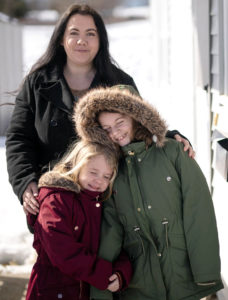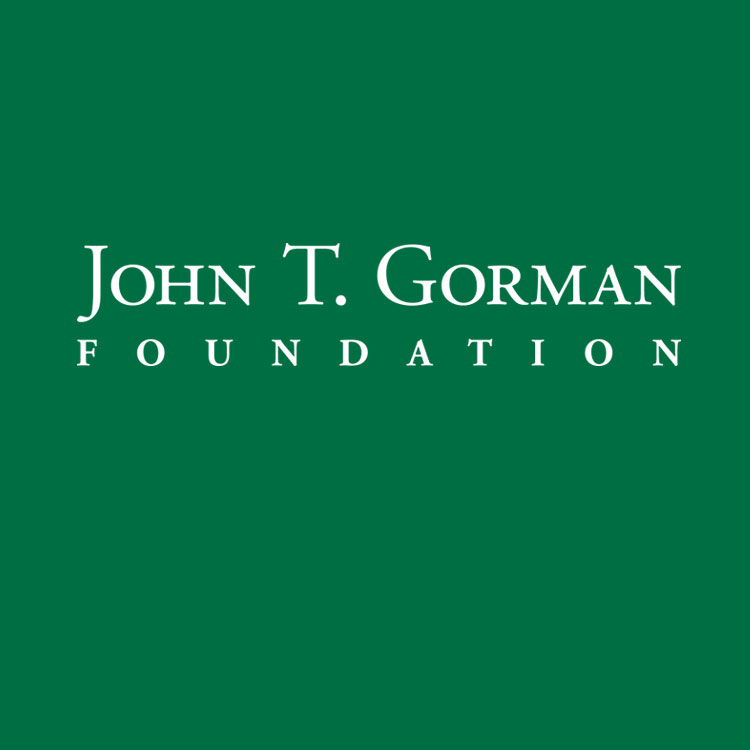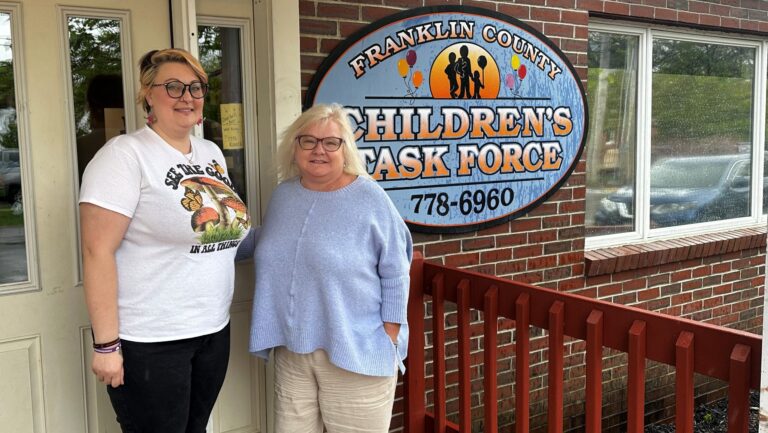Bangor Housing is piloting a national model for strengthening family well-being and economic mobility by focusing on maternal mental health

In its ongoing efforts to find new strategies to help residents improve their economic mobility, Bangor Housing recently conducted a survey on the biggest barrier to employment. The answer surprised them.
“We expected to see something like childcare or transportation rise to the top,” said Liz Marsh, Director of Resident Services. “But the number one barrier for employment our residents listed was health – mental health, in particular.”
Bangor Housing serves 427 families in the Capehart community alone – over 90% of which have a female head of household and 72% are led by single mothers. In deciding where to target mental health supports, maternal depression emerged as a critical area of concern.
In Maine, about 1 in 8 mothers have reported depressive symptoms in the three months after giving birth, and over 28% of Maine mothers of babies and toddlers have reported less-than-optimal mental health, compared to 22% nationally. But there are great inequities in this data. For instance, Maine mothers with low incomes are twice as likely to face postpartum depression compared to those with higher incomes – while facing a greater number of barriers to receiving treatment, including cost, access to providers, lack of transportation, childcare, and stigma.
Maternal depression has an effect not just on mothers, but on their entire families. Without the right kind of support, mothers with depression can have a more difficult time caring for and bonding with their children, which can have a direct impact on children’s developmental and mental health outcomes. The condition also hampers a mother’s ability to provide for her family through employment.
Over the last several years, Bangor Housing has implemented a robust offering of programs – including Moving Families Forward and an Enhanced Family Self Sufficiency program – to help families build greater well-being while achieving their economic goals. Leveraging a network of community partners, these programs engage an array of supports, including financial asset building, educational opportunities, job training, childcare, and coaching.
With survey results shedding light on an additional area of need, Bangor Housing sought a strategy to further integrate targeted mental health supports into its approach. Working with the John T. Gorman Foundation, Bangor Housing connected with an evidence-based model that has demonstrated positive results around the country – the MOMS (Mental Health Outreach for MotherS) Partnership.
The MOMS Partnership was developed at Yale University in 2011 by Dr. Megan Smith, an expert in maternal depression. Through her research, she recognized that mothers experiencing poverty were the most likely to need treatment for depression, but the least likely to receive it. In response, she developed a model of low-barrier mental health support that would not only help mothers with low incomes address their depression symptoms, but ultimately improve their ability to provide for their families.
Now implemented by Yale’s Elevate policy lab, the model includes several components. At its core is an eight-week stress management course that uses elements of cognitive behavioral therapy to help participants build skills for changing mood and behavior. The course is delivered in a group setting and is co-led by a mental health clinician and a Community Mental Health Ambassador (CMHA), a mother from the community who shares similar lived experiences to participants. To address other common barriers, the program is based at a community space mothers identify as convenient, accessible, and safe. Financial incentives are also provided to compensate mothers for their time and support them in meeting their families’ basic needs.
Since first being piloted in New Haven, Connecticut, the program has been implemented in eight other sites across the country, in both rural and urban settings. Though the approach is delivered with each community’s unique needs and context in mind, the program reports consistent outcomes across sites. These include a reduction in maternal depressive symptoms, increase in social support, increase in maternal employment, and an increase in a mother’s ability to meet her family’s basic needs.
Partners believe that MOMS is well positioned to succeed in Bangor – the program highly aligns with Bangor Housing’s whole family approach and many foundational components are already in place. These include Bangor Housing’s existing relationships with families, on-site space, and connections to community partners.
Importantly, the State of Maine has also stepped in as a critical partner. The State is using federal Temporary Assistance for Needy Families (TANF) funding to cover the costs of implementing the model at Bangor Housing, as part of its support for whole-family strategies. In its efforts to test strategies for strengthening children and families, the John T. Gorman Foundation has provided a grant to Yale to pay for the MOMS training, technical assistance, and evaluation.
The Maine MOMS team is currently preparing to launch the first cohort of 8-10 participants. Eligible women will be women caregivers of children under age 18 who have been screened for mild to moderate depressive symptoms. During the pilot phase, Bangor Housing hopes to deliver the program to 75 women.
Community Mental Health Ambassador Jordan DeMerchant, a mother living in the Capehart neighborhood, said there is a definite need for the type of supports MOMS offers.
“I think it’s going to be really helpful for the community,” she said. “If families are doing better because of the mental health care delivered through MOMS, that just opens so many doors.”


